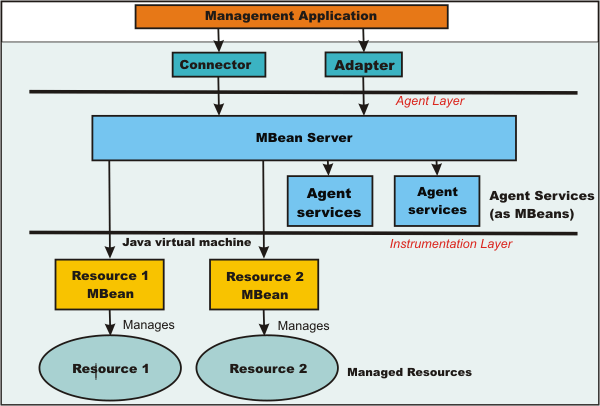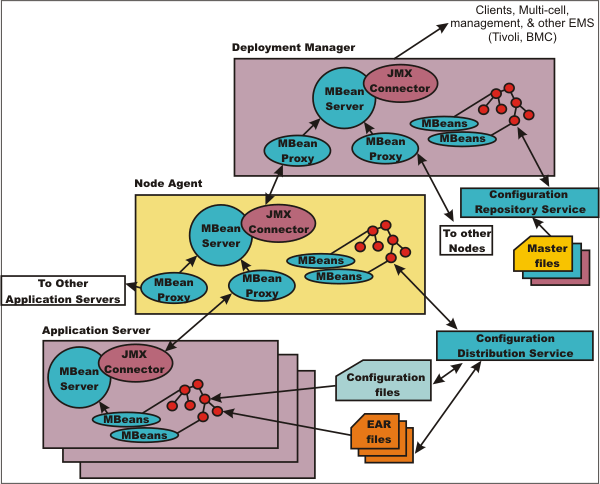Use wsadmin scripting with JMX
JMX is a framework that provides a standard way of exposing Java resources, for example, application servers, to a system management infrastructure. Using the JMX framework, a provider can implement functions, such as listing the configuration settings, and editing the settings. This framework also includes a notification layer that management applications can use to monitor events such as the startup of an application server.
JMX key features
The key features of the WAS implementation of JMX include:
- All processes that run the JMX agent.
- All runtime administration performed through JMX operations.
- Connectors used to connect a JMX agent to a remote JMX-enabled
management application. The following connectors are supported:
- SOAP JMX Connector
- JMX Remote API (JSR 160) Remote
Method Invocation over the Internet Inter-ORB Protocol (RMI-IIOP)
JMX Connector, (the JSR160RMI connector)
- Remote Method Invocation over the Internet Inter-ORB Protocol (RMI-IIOP) JMX Connector
- Inter-Process Communications (IPC)
- SOAP JMX Connector
- Protocol adapters that provide a management view of the JMX agent through a given protocol. Management applications that connect to a protocol adapter are usually specific to a given protocol.
- The ability to query and update the configuration settings of a runtime object.
- The ability to load, initialize, change, and monitor application components and resources during run time.
JMX architecture
The JMX architecture is structured into three layers:
- Instrumentation layer - Dictates how resources can be wrapped
within special Java beans, called managed beans (MBeans).
- Agent layer - Consists of the MBean server and agents, which provide a management infrastructure. The services that are implemented include:
- Monitor
- Event notification
- Timers
- Monitor
- Management layer - Defines how external management applications can interact with the underlying layers in terms of protocols, APIs, and so on. This layer uses an implementation of the distributed services specification (JSR-077), which is part of the J2EE specification.
The layered architecture of JMX is summarized in the following figure:
Figure 1. JMX architecture

JMX distributed administration
The following figure shows how the JMX architecture fits into the overall distributed administration topology of a WAS Network Deployment environment:
Figure 2. Distributed administration of JMX

The key points of this distributed administration architecture include:
- Internal MBeans that are local to the JVM
register with the local MBean server.
- External MBeans have a local proxy to their MBean server. The proxy registers with the local MBean server.
Using the MBean proxy the local MBean server can pass the message to an external MBean server located on:
- A node agent that has an MBean proxy for all the servers within its node. The MBean proxies for other nodes are not used.
- The deployment manager has MBean proxies for all the node agents in the cell.
- A node agent that has an MBean proxy for all the servers within its node. The MBean proxies for other nodes are not used.
JMX Mbeans
The product provides a number of MBeans, each of which has different functions and operations available. For example, an application server MBean can expose operations such as start and stop. An application MBean can expose operations such as install and uninstall. Some JMX usage scenarios that we can encounter include:
- External programs that are written to control the WAS Network Deployment run time and its WebSphere resources by programmatically accessing the JMX API.
- Third-party applications that include custom JMX MBeans as part of the deployed code, supporting the JMX API management of application components and resources.
The following example illustrates how to obtain the name of a particular MBean:
Jacl:
- set am [$AdminControl queryNames type=ApplicationManager,process=server1,*]
Using Jython:
- am = AdminControl.queryNames('type=ApplicationManager,process=server1,*')
Each WAS runtime MBean can have attributes, operations, and notifications. The complete documentation for each MBean supplied with the product is available in this information center at information_center > Reference > Programming interfaces > Mbean interfaces.
JMX benefits
The use of JMX for management functions in WebSphere Application Server provides the following benefits:
- Enables the management of Java applications without significant
investment.
- Relies on a core-managed object server that acts as a management agent.
- Java applications can embed a managed object server and make some of its functionality available as one or several MBeans that are registered with the object server.
- Provides a scalable management architecture.
- Every JMX agent service is an independent module that can be plugged
into the management agent.
- The API is extensible, allowing new WebSphere Application Server and custom application features to be easily added and exposed through this management interface.
- Integrates existing management solutions.
- Each process is self-sufficient when it comes to the management of its resources. No central point of control exists. In principle, a JMX-enabled management client can be connected to any managed process and interact with the MBeans that are hosted by that process.
- JMX provides a single, flat, domain-wide approach to system management.
Separate processes interact through MBean proxies that support a single management client to seamlessly navigate through a network of managed processes.
- Defines the interfaces necessary for management only.
- Provides a standard API for exposing application and administrative resources to management tools.
Related concepts
Related tasks